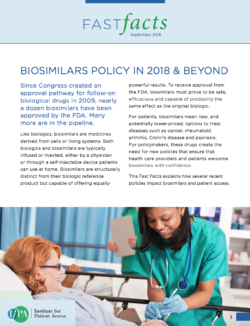New “Fast Facts” Recaps Biosimilar Policy Developments
September 13, 2018
Given the Trump administration’s rapid succession of proposals, policy plans and regulatory developments, 2018 may well be the year of biosimilars policy. The Institute for Patient Access has a new “Fast Facts” to get readers up to speed.
Derived from living cells or systems, biologic and biosimilar medications treat cancer, rheumatoid arthritis, Crohn’s disease and a range of other diseases. The breakthrough drugs required Congress to create a new regulatory pathway in 2009 – and have continued to spur new laws and regulatory guidance since then. In “Biosimilars Policy in 2018 & Beyond,” the Institute for Patient Access explains.
Some new policies bode well for patient access. The “Fast Facts” notes that unique Medicare billing codes for biosimilars, for instance, can encourage competition among manufacturers. “If biosimilars are billed and reimbursed at the same rate, manufacturers have less incentive to invest in and develop biosimilars after an initial biosimilar has been introduced,” the policy paper explains, adding, “This means fewer treatment options for patients.” Unique billing codes can also help protect patient safety by enabling physicians and patients to trace side effects to their source.
But other policies are problematic. In the Trump administration’s Blueprint to Lower Drug Prices and Reduce Out-of-Pocket Costs, issued in May, the Department of Health and Human Services proposes shifting some Medicare medications from Part B to Part D. This could have unintended consequences for patients.
The “Fast Facts” notes that, while Part B covers all FDA-approved drugs, Part D uses a formulary to dictate which drugs are covered or preferred. Moving Part B drugs into a formulary structure could limit patient choice. Out-of-pocket expenses could also rise, because the supplemental insurance that many seniors use to cover their Part B expenses would not apply to Part D.
The paper flags another policy change that could impact patient access: the use of step therapy for Medicare Advantage plans. Under the new policy, “seniors who are prescribed a biologic or biosimilar may now be required to ‘fail first’ on a different, insurer-preferred drug before gaining access to the one their physician prescribed,” the paper notes. Step therapy is designed to lower insurers’ costs but can delay patient access and trigger new or reemerging symptoms.
And further developments remain. Moving forward, the administration looks to encourage market competition with its Biosimilars Action Plan, the “Fast Facts” explains. The plan aims to make the regulatory approval process more efficient and to improve education about biosimilars.
Meanwhile, final guidance on what qualifies a biosimilar as interchangeable with its biologic reference product is forthcoming. On this guidance, the “Fast Facts” argues, regulators should require rigorous testing on the effect of multiple switches among a biosimilar and biologic. “Whether due to physician or patient preference, changes in out-of-pocket costs that influence treatment choices or alterations in health plan coverage,” the paper notes, multiple switches are likely in real-world use of biosimilars. Having comprehensive data on these switches can instill physician confidence in biosimilars – which, the paper explains, is critical for uptake.
To learn more, read IfPA’s “Fast Facts: Biosimilars Policy in 2018 & Beyond.”
Tags: Biologics, Regulatory IssuesCategorized in: Blog


